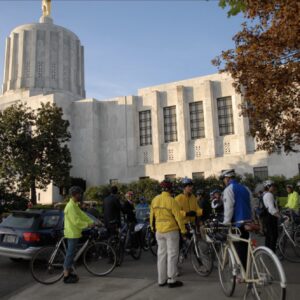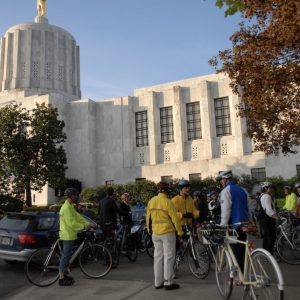Today was the first day Oregon legislators and their staff were allowed into the State Capitol building in Salem. The session doesn’t officially begin until next Tuesday (January 21st), but buzz is already building around what’s to come: this session lawmakers and advocates will attempt to hammer out a major transportation funding package.
It will take a lot of advocacy and lobbying to make sure the package reflects a progressive view of transportation that goes well beyond freeway expansions and driving-centric megaprojects. The Oregon Moves Political Action Committee (PAC) is one of the groups that will do that work. This PAC will work directly with legislators to influence policy and they’ll need to raise money to do it. That’s why they’ve planned a campaign launch and fundraiser later this month.
“Join us and learn how you can help us win safer streets, better transit and climate action in the upcoming transportation package!” reads an invite to the January 24th launch event. Illustrating just what’s at stake is an impressive list of speakers and hosts that includes: Oregon State Senator Khanh Pham, Metro Councilor Juan Carlos Gonzalez, Portland City Councilor Candace Avalos, and noted activists Cassie Wilson (Move Oregon Forward), Michelle DuBarry (Families for Safe Streets), Nolan Lienhart (ZGF Architects), and Nat West (former city council candidate).
The Oregon Moves PAC launched in December 2023. State records show that so far the PAC has raised $55,500 from two donors: $55,000 from Lake Oswego-based philanthropist and software business owner Mike Perham (who’s also a co-owner of BikePortland), and $500 from William Henderson, former CEO of Ride Report. The PAC’s sole paid staffer is by Aaron Brown, one of the co-founders of No More Freeways and legislative aide to Senator Khanh Pham.
Note that Oregon Moves PAC is separate from Move Oregon Forward, which is a coalition of 501c3 nonprofits that have legal restrictions around political lobbying.
The January 24th launch event will take place from 6:30 to 8:30 pm at Taborspace (5441 SE Belmont). RSVP here.







Thanks for reading.
BikePortland has served this community with independent community journalism since 2005. We rely on subscriptions from readers like you to survive. Your financial support is vital in keeping this valuable resource alive and well.
Please subscribe today to strengthen and expand our work.
I wish the group well but the “crowdfunding” (or bake sale) approach makes me think they have no chance in going up against the well-funded freight and trucking groups who have such a huge financial stake in expanding their supply routes.
I love railroads but you can see why they are failing when ODOT uses our taxes and fees to build highway infrastructure that trucking companies use for free (basically).
Sorry I don’t have a better idea here but thanks for letting us know about the event.
That’s not what EconNW says:
In other words, trucking companies are paying more than their share.
https://www.oregon.gov/das/oea/Documents/ECONW_HCAS-Cost-Allocation-Study-2023-25.pdf
Comment of the day. Thanks Watts!
As if anyone pays their share. Besides the crumbling infrastructure, the externalities are melting the ice caps and suffocating us in CO2.
“the externalities are melting the ice caps and suffocating us in CO2.”
Yes. That’s why electrification is so urgent.
I feel like I have more questions than answers after reading that study. The most impact factor (how wear/costs are allocated with regard to weight and axles) is abstracted to a “detailed model”, but not discussed beyond that (p. 20/21). It’s hard to judge from the appendix exactly how these weights factor in, though I guess I appreciate the detailed explanation how the model calls different methods (/s). Point is, everything in this study relies on how their model allocates roadway damage based on weight and it would be nice to see that spelled out more explicitly.
You took the bait, Watts! That was basically a trolling comment to see who would bring up the tired old data about trucks paying “more than their fair share.”
As someone else said here, basically NO ONE is paying their fair share. Uncle Sugar is paying for everything – or more accurately NOT paying but instead borrowing so future generations are on the hook to pay.
My comment was a troll to see who even cares about this topic at all, and you bit!
I think trying to figure out which vehicle costs how much and allocating fees on that basis is a fool’s errand; we obviously need roads, and obviously need to pay for them somehow, but I am less concerned about ensuring that transportation related revenue exactly balances transportation related costs. It’s more important to me that the overall budget makes sense.
When you bring up undefinable concepts like “fair share” I know we’ll be in for a long night.
I love the concept of the “fair share”. Everyone is sure they pay theirs and sure everyone else doesn’t.
PACs are typically 501(c)(4) nonprofits that allow for unlimited lobbying and personnel expenses. The “legal restrictions” on 501(c)(3) nonprofits are less important than they used to be: the IRS allows up to 69.9% of charitable funds to be used for non-mission uses such as salaries; the 5% lobbying expense rule was (and still is) a US Postal Service restriction for any nonprofit wanting to use their bulk postage rates, but most nonprofits do everything electronically now and hardly ever snail-mail anything. However, most nonprofit boards tend to be ultra uber conservative and are still stuck in 1976, so most nonprofit staff try to avoid doing anything that might possibly upset their (hypothetical) lawyers.
Many organizations will have both a 501(c)(3) for tax-deductible donations and a 501(c)(4) for lobbying purposes.
In addition, the term “lobbying” is becoming increasingly vague and flexible, particularly with grass-roots lobbying and lobbying for policy changes rather than particular projects and/or politicians. A lot of 501(c)(3) nonprofits do grass-roots policy lobbying without really realizing it (it’s often even part of their core mission), and since the US Postal stuff is now largely ignored, no one really cares very much about it any longer, not even the IRS, as long as everyone claims to be working “in good faith.”
Yes – and under the incoming administration pretty much nothing will ever be enforced, so almost anyone can do almost anything.
Keep in mind that 501(c)(3) nonprofits are specifically designed to give tax deductions for people who do their IRS 1040 Schedule A forms (more or less just rich people these days as well as major corporations), so both types of nonprofits help support the rich on avoiding taxes, Democrats and Republicans alike, and the outgoing administration has also been equally super-supportive of the nonprofit industrial complex.